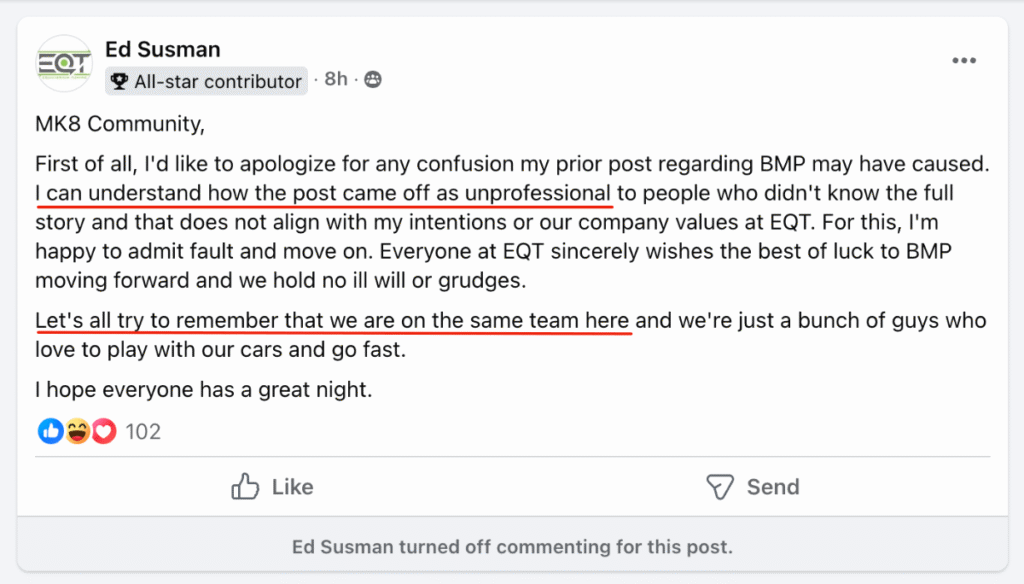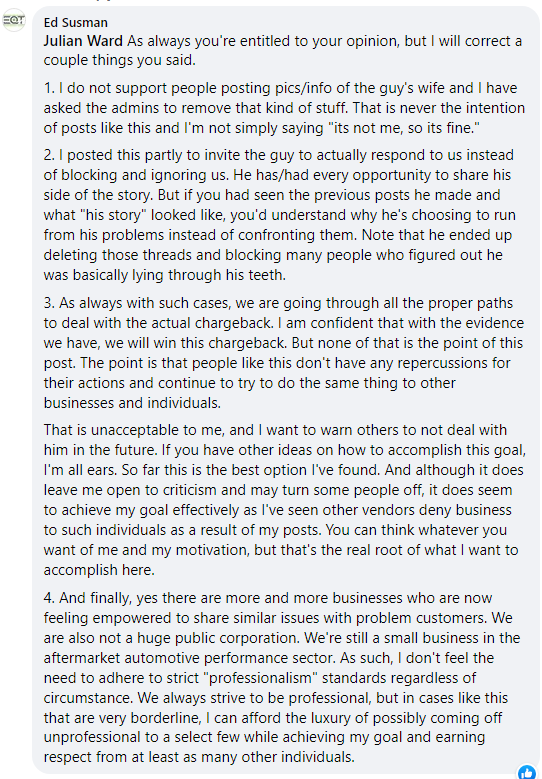An unusual series of exchanges involving two companies I have done business with was brought to my attention.
Although the topic of discussion was not particularly noteworthy, I found it interesting that the main participants, well-known and seemingly successful owners, embody starkly contrasting business ethics.
In the first example, from Autrey McVicker, we have what I think people instinctively expect of a business that takes our money in exchange for products.
The principles of doing what is proper and ethical are the top priority for the business.

On the other side of the issue was Ed Susman, who has previously provided insight into his view of ethics (full context further below):

Ed’s approach is akin to, I’ll lie when I find it useful, and when it suits me, I’ll try to be honest, failing to grasp that once you lie, you become a liar.
Ethics, professionalism, and good morals— you either have them or you don’t.

Addendum:

A follow-up damage control commentary by EQT owner Ed Susman is too rich with deception to pass up analyzing.
For context: Ed made comments criticizing BMP Tuning owner Autrey McVicker, comments that consumers did not receive well.
First example:
Ed starts by apologizing for his unprofessionalism, but a closer look, and a reflection on the lengthy series of examples of Ed Susman bullshitting consumers (References below), sheds a different light on this “apology.”
Ed offers a superficial apology, acknowledging “unprofessional behavior” to placate dissatisfied consumers. However, as shown above, Ed has admitted to behaving unprofessionally when he believes it will help him achieve his goals.
The apology is not about correcting the issue but calming immediate outrage to protect EQTs reputation.

Ed is “deflecting.” By seeming to admit to unprofessionalism, he creates a sense of resolution while avoiding more scrutiny of his repeated actions (an element of Autrey McVicker’s dissatisfaction with Ed Susman).
This serves to momentarily appease angry consumers and deceive newer consumers into believing the business is responsive and professional.
Second example:
Ed continues with his manipulative tactics by stating:
Let’s all try to remember that we are on the same team here…
Ed Susman – Owner of Equilibirumiim Tuning INC
This statement positions the business owner as a peer of the consumers rather than a service provider, fostering an emotional connection.
Ed is again deflecting, reframing the situation to imply that the criticism disrupts harmony. This attempt shifts the focus away from consumers’ legitimate complaints and discourages further critique.
Suggesting that those expressing negative views are acting against the collective good is an effort to isolate them and delegitimize their concerns.
Ed’s comments are also geared toward mobilizing EQT’s fan base by implying the criticism he received is not aligned with the “team,” prompting others to rally in defense of the business.
Summary:
Recognizing this tactic as a red flag is important for consumers. They must be wary when a business uses emotionally charged language to deflect criticism instead of addressing the specific issue.
This tactic contributes to a toxic review environment where legitimate concerns are stifled.
References:
- Equilibrium Tuning unsubstantiated claims about product performance
- Equilibrium Tuning misleading claims for independent product testing
- Ed Susman’s false statements about the flow bench that I use
- Ed Susman’s false statements about my consideration of data
- Ed Susman’s false statements about the testing I’ve done being flawed
- Ed Susman’s false statements about the testing that I perform being limited
- Ed Susman’s false statements about me being a hack
- Ed Susman’s false statements about questions I emailed to the business containing “demands”
- Ed Susman’s false statements to another consumer who commented on my review
- Ed Susman’s statements about professionalism being optional
- Ed Susman’s false statements to a performance shop employee who questioned Ed’s claims
- Ed Susman makes threats to suppress a consumer review
- Ed Susman bullshits a consumer on social media
- Equilibrium Tuning unsubstantiated claim about tune reliability being OEM-like.
- Ed Susman’s false statements to consumers about a tune reliability post.
- Equilibrium Tuning false advertising of independent testing.
- Ed Susman’s bullshitting has consequences for consumers.
- Ed Susman’s bullshitting a consumer about the ARM Motorsport intercooler.
Full context of Ed’s statements:
Ed Susman thoroughly explains why he castigated a customer of EQTs on social media.

